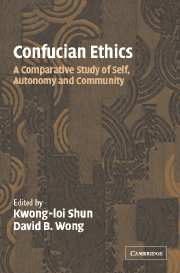9 - Questions for Confucians: Reflections on the Essays in Comparative Study of Self, Autonomy, and Community
Published online by Cambridge University Press: 08 December 2009
Summary
These essays are timely. As contributions to academic enquiry into topics central to the Confucian tradition by philosophers at home in both Chinese and American philosophy, they bring us a stage nearer to widespread recognition that American philosophy can only flourish as a conversation of diverse voices from conflicting standpoints, among which a range of Chinese voices have an important place. Earlier scholars as various in their distinction as Wing-Tsit Chan, Angus Graham and David Nivison had already made this recognition possible some time ago. But they did so in a period in which the vast majority of American philosophers took it for granted that the study of Chinese philosophy was eccentric to their own concerns, of interest only to specialists in that field. We are happily moving away from such cultural narrowness, and the present essays are one more sign of progress.
There is however another reason for welcoming these essays at this particular time. We now inhabit a world in which ethical inquiry without a comparative dimension is obviously defective. Chad Hansen raises some of the key issues for comparative ethics with admirable clarity, suggesting that, when we become aware of some rival moral perspective, we may put in question our confidence in what we have hitherto taken for granted, provided that three conditions are satisfied: first, that the rival moral tradition that we encounter differs significantly from our own conceptually or theoretically; second, that it is “an intellectually rich, reflective, hierarchical system of norms”; and third, that it “yields moral insights that impress us from our present moral point of view” (Chapter 4, p.
- Type
- Chapter
- Information
- Confucian EthicsA Comparative Study of Self, Autonomy, and Community, pp. 203 - 218Publisher: Cambridge University PressPrint publication year: 2004
- 6
- Cited by

